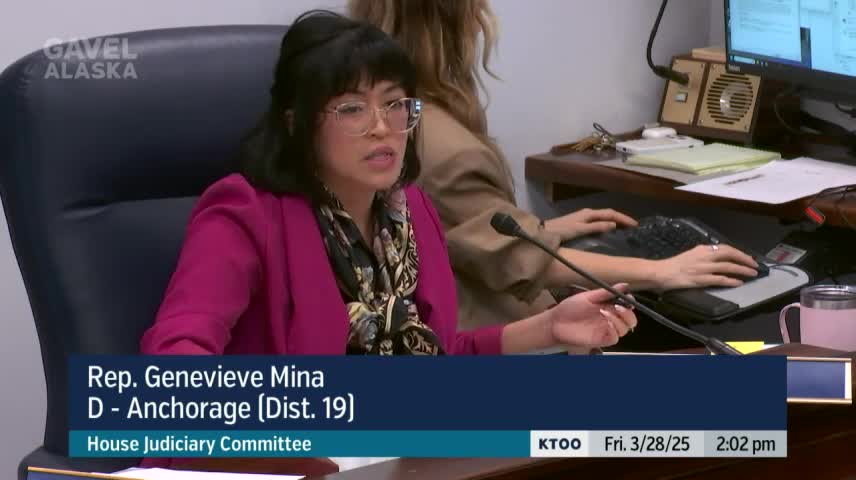House committee hears bill to have state file PFDs for parents behind on child support
Get AI-powered insights, summaries, and transcripts
Subscribe
Summary
Representative Ashley Kerrick told the House Judiciary Committee on March 28 that House Bill 137 would direct the state to apply for Permanent Fund Dividends on behalf of Alaska residents who owe child support and have not filed their PFD applications, so that the dividend can be used to satisfy arrears.
Representative Ashley Kerrick, sponsor of House Bill 137, told the House Judiciary Committee on March 28 that the bill would allow the state to apply for a Permanent Fund Dividend on behalf of eligible residents who owe child support but did not file their own PFD application by the March 31 deadline.
The bill would require the Child Support Services Division to send the Department of Revenue a list of residents behind on child support between Jan. 1 and March 31 each year. If an individual in arrears has not filed a PFD by March 31 and the division believes the person is eligible, the Department of Revenue would file the PFD on that person’s behalf and notify both the person who owes support and the custodial parent owed support. The bill specifies a 7% deduction from any PFD distributed under these rules for administrative costs to be deposited in the general fund, and it applies beginning with the 2025 qualifying year.
"House Bill 137 allows the state to apply for permanent fund dividends on behalf of eligible residents who are behind on child support and have not filed their own PFD applications by the deadline," Representative Kerrick said. She told the committee the change addresses a gap in the child support system: some noncustodial parents intentionally decline to apply for the PFD to avoid garnishment, leaving custodial parents without that annual payment.
Committee members questioned how eligibility, confidentiality and delivery of the funds would be handled. Representative Costello asked whether the list provided to the Department of Revenue would remain confidential. Representative Kerrick and staff explained the Child Support Services Division already maintains a confidential list of individuals in arrears and that the bill would not change that confidentiality practice.
Griffin Succao, staff to Representative Kerrick, walked the committee through bill sections. He said the bill would: (1) treat a PFD paid to satisfy child support arrears as a child support payment; (2) require the Child Support Services Division to provide an arrears list to Revenue; (3) direct Revenue to apply for a PFD on behalf of an eligible non‑filing individual in arrears; (4) require notice to both the noncustodial parent and the custodial parent and allow responses and evidence of ineligibility; and (5) prohibit donations from PFDs distributed under the bill and bar garnishment of those PFDs for other debts.
Phuong Brand (who said she goes by Chris), Child Support Enforcement Director, confirmed the division already has statutory authority to apply for a PFD in some cases and works with the Department of Law and court processes for enforcement. Brand told the committee the division handles cases where individuals “evade” applying and that the division takes cases to court when appropriate.
Genevieve Wojtasik and Jennifer Wojtusic, from the Permanent Fund Dividend Division, told the committee the division does not currently file on behalf of applicants and that implementing the bill would require new regulations to define process and liability. Director Wojtusic said implementation details—such as who bears liability if the department files an incorrect application—would need to be worked out.
Committee members asked several operational questions that were not resolved in the hearing: how the garnished funds would be delivered to custodial parents, how the Department of Revenue would confirm out‑of‑state residency or ineligibility, and whether the department would have authority to file for individuals who did not meet PFD eligibility criteria. Staff said those process questions would require further work with the PFD division and Department of Law.
Two invited witnesses described their experiences as custodial parents denied PFD funds because a noncustodial parent refused to apply. Lindsay Karvelik said she has been owed child support since 2007 and has never received a PFD applied on her son’s behalf despite the division’s efforts. "I have been on that list every year since 02/2007. I have never received the PFD on behalf of my son," Karvelik told the committee. Laura Norton Cruz, a licensed social worker, described financial abuse and coercive control and said the bill would help reduce a tactic abusers use to withhold financial support from children.
Committee members also explored legal interactions with other statutory programs. Representative Vance asked whether a PFD garnished for child support would have priority over other statutory claims (including the restorative justice account used for certain forfeited PFDs). Permanent Fund Division staff said they would need an opinion from the Department of Law on statutory priority but that the division can identify when a PFD has already been assigned to another program, avoiding a double allocation.
There was no formal vote on House Bill 137. Chair Gray said the committee would set the bill aside and bring it up at a later date for additional work on implementation details.
The hearing record includes detailed section‑by‑section language presented by staff; the bill as introduced would: assume prior eligibility unless a person proves ineligibility, eliminate the signed residency certification requirement in some circumstances, and bar donations from PFDs claimed under the child‑support process. The committee did not adopt changes at the hearing.
Committee staff said they will follow up with Department of Law and the PFD division on liability, the delivery process for garnished PFDs, residency verification for out‑of‑state noncustodial parents, and administrative cost assumptions for the 7% deduction.
No action was taken to advance House Bill 137 at this hearing; the bill was tabled for further work and will be brought back for additional testimony and possible committee action at a future meeting.
